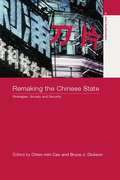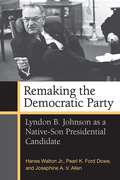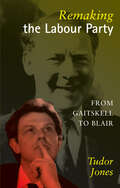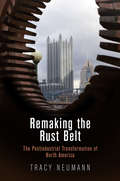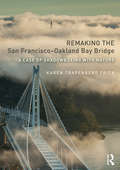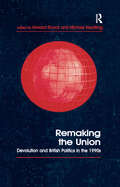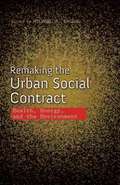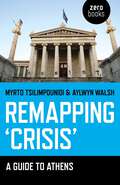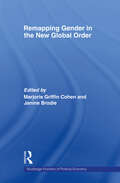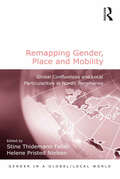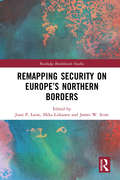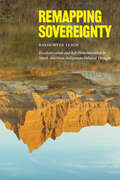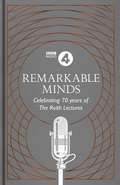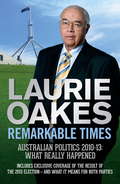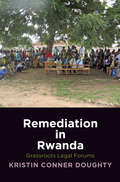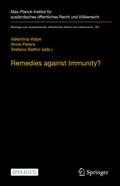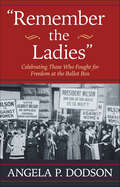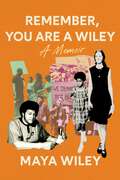- Table View
- List View
Remaking the Chinese State: Strategies, Society, and Security (Asia's Transformations)
by Chien-Min Chao Bruce J. DicksonAfter more than twenty years of economic and political reform, China is a vastly different country to that left by Mao. Almost all the characteristic policies and practices of the Maoist era have been abandoned, with the goals of revolution in foreign and domestic policy being replaced by an emphasis on economic modernization, accompanied by radical social transformation and an increasingly significant international role. Yet, despite these dramatic changes other fundamental features of China's policy remain unchanged.This book explores the strategies of reform in China and their implications for its domestic and foreign policies. It challenges the misconceptions that no political reforms are taking place and that China is eagerly embracing capitalism. It also challenges the view that China does not abide by international norms and practices on military and security matters. Its contributors, all highly respected scholars, avoid simple generalisations about the nature of China's politics or future path, instead offering comparisons and contrasts between policy areas and regions to create a more complete picture of this complex country.
Remaking the Democratic Party: Lyndon B. Johnson as a Native-Son Presidential Candidate
by Hanes Walton Pearl K. Dowe Brandon Walton Josephine AllenA continuation of Hanes Walton Jr.'s work on Southern Democratic presidents, Remaking the Democratic Party analyzes the congressional and presidential elections of Lyndon Baines Johnson. This study builds upon the general theory of the native-son phenomenon to demonstrate that a Southern native-son can win the presidency without the localism evident in the elections of Bill Clinton and Jimmy Carter. Although ridiculed by contemporaries for his apparent lack of control over formal party politics and the national committee, Johnson excelled at leading the Democratic Party's policy agenda. While a senator and as president, Johnson advocated for--and secured--liberal social welfare and civil rights legislation, forcing the party to break with its Southern tradition of elitism, conservatism, and white supremacy. In a way, Johnson set the terms for the continuing partisan battle because, by countering the Democrats' new ideology, the Republican Party also underwent a transformation.
Remaking the Labour Party: From Gaitskell to Blair
by Tudor JonesRemaking the Labour Party examines the development of revisionist thought in the Labour Party from the 1950s up to Tony Blair's successful attempt to rewrite Clause Four in April 1995. The main focus is upon the most distinctive and controversial aspect of Labour revisionism - its attitude toward public ownership and socialism, private ownership and the mixed economy.Remaking the Labour Party comprises a detailed study of a process of ideological conflict which began with the Labour Party's debate in the 1950s over the link between public ownership and socialism. The deepening confrontation that arose from the revisionist thinking of Crosland and Gaitskell is explored in the Clause Four controversy of 1959-60 and in the uneasy compromise forged in its aftermath. The period of ideological truce under Harold Wilson's leadership is examined, together with the bitter conflict that later resurfaced in the party during the 1970s and early 80s. Finally, the study focuses on the second stage of Labour's policy and ideological rethinking which developed after 1983 under the leadership first of Neil Kinnock and then of Tony Blair.Drwing on the author's own interviews with some of the leading protagonists of the debate, as well as upon a wide range of primary and secondary sources, Remaking the Labour Party will be of value to students of modern British politics and political thought, it will also be of interest to observers and members of the Labour Party.
Remaking the Rust Belt: The Postindustrial Transformation of North America (American Business, Politics, and Society)
by Tracy NeumannCities in the North Atlantic coal and steel belt embodied industrial power in the early twentieth century, but by the 1970s, their economic and political might had been significantly diminished by newly industrializing regions in the Global South. This was not simply a North American phenomenon—the precipitous decline of mature steel centers like Pittsburgh, Pennsylvania, and Hamilton, Ontario, was a bellwether for similar cities around the world.Contemporary narratives of the decline of basic industry on both sides of the Atlantic make the postindustrial transformation of old manufacturing centers seem inevitable, the product of natural business cycles and neutral market forces. In Remaking the Rust Belt, Tracy Neumann tells a different story, one in which local political and business elites, drawing on a limited set of internationally circulating redevelopment models, pursued postindustrial urban visions. They hired the same consulting firms; shared ideas about urban revitalization on study tours, at conferences, and in the pages of professional journals; and began to plan cities oriented around services rather than manufacturing—all well in advance of the economic malaise of the 1970s.While postindustrialism remade cities, it came with high costs. In following this strategy, public officials sacrificed the well-being of large portions of their populations. Remaking the Rust Belt recounts how local leaders throughout the Rust Belt created the jobs, services, leisure activities, and cultural institutions that they believed would attract younger, educated, middle-class professionals. In the process, they abandoned social democratic goals and widened and deepened economic inequality among urban residents.
Remaking the San Francisco-Oakland Bay Bridge: A Case of Shadowboxing with Nature (Planning, History and Environment Series)
by Karen Trapenberg FrickWinner of TransportiCA’s September Book Club Award 2018 On 17 October 1989 one the largest earthquakes to occur in California since the San Francisco earthquake of April 1906 struck Northern California. Damage was extensive, none more so than the partial collapse of the San Francisco–Oakland Bay Bridge’s eastern span, a vital link used by hundreds of thousands of Californians every day. The bridge was closed for a month for repairs and then reopened to traffic. But what ensued over the next 25 years is the extraordinary story that Karen Trapenberg Frick tells here. It is a cautionary tale to which any governing authority embarking on a megaproject should pay heed. She describes the process by which the bridge was eventually replaced as an exercise in shadowboxing which pitted the combined talents and shortcomings, partnerships and jealousies, ingenuity and obtuseness, generosity and parsimony of the State’s and the region’s leading elected officials, engineers, architects and other members of the governing elites against a collectively imagined future catastrophe of unknown proportions. In so doing she highlights three key questions: If safety was the reason to replace the bridge, why did it take almost 25 years to do so? How did an original estimate of $250 million in 1995 soar to $6.5 billion by 2014? And why was such a complex design chosen? Her final chapter – part epilogue, part reflection – provides recommendations to improve megaproject delivery and design.
Remaking the Union: Devolution and British Politics in the 1990s (Routledge Studies in Federalism and Decentralization)
by Michael Keating Howard ElcockThis volume addresses the issues arising from the recent devolution referenda by exploring the historical development of the proposals, the importance of national and regional identities, the changing policies of the political parties and the approaches of business and other major groups towards devolution. It also looks at the impact on electoral reform coming from the proposal that proportional representation be used to elect the regional assemblies and how the new assemblies are to be financed. Finally the book discusses the implications of a devolved British state where different countries and regions achieve different levels of autonomy at different paces.
Remaking the Urban Social Contract: Health, Energy, and the Environment
by Michael A. PaganoThis new volume draws from provocative discussions on the urban social contract among policy makers, researchers, public intellectuals, and citizens at the 2015 UIC Urban Forum. Michael A. Pagano presents papers that emphasize political agreements, disagreements, challenges, and controversies on health, energy, and environmental policies. Authors explore the substantive and philosophical changes in the urban social contract and offer proposals for remaking it in the new century. Topics range from big-picture analyses to specifics covering areas like public services, the smart cities movement, and greening strategies. Contributors: Alba Alexander, Megan Houston, Dennis R. Judd, Cynthia Klein-Banai, William C. Kling, Howard A. Learner, David A. McDonald, David C. Perry, Emily Stiehl, Anthony Townsend, Natalia Villamizar-Duarte, and Moira Zellner.
Remapping 'Crisis': A Guide to Athens
by Myrto Tsilimpounidi Aylwyn WalshIn periods of intense crisis the pressing need to take sides comes to the surface and trumps neutrality. The claim to objectivity, always a little problematic, can no longer be sustained, and becomes itself a ground of confrontation as the conflicts amongst economists and constitutional lawyers show. As the world is moving towards a state of permanent crisis the engaged intellectual and the committed media are coming back (Costas Douzinas, Professor of Law and Contributor to The Guardian). This is a crucial collection that provides a new perspective on the social dimension of crisis - exemplified in the new wave of social mobilization gaining ground across the globe. The collection is an invigorating addition to the market of ideas circulating at this time of uncertainty, austerity and social change. It is an important and timely contribution to the study of social movements and the rise of direct civil action in pursuit of democracy. In this milieu of social change, Athens is its muse. This book is one of the first collections of chapters devoted to the specificities of Greece&’s crisis in English that does not focus solely on economics. Its scope and intention aligns it with other recently published books on the &‘Arab Spring&’ and the &‘Occupy&’ movements, although its register moves away from journalistic commentary to academic considerations of futurity and the potential of the city to reinvent itself. This makes it a unique interdisciplinary project with a broad appeal.
Remapping Cold War Media: Institutions, Infrastructures, Translations
by Alice Lovejoy and Mari PajalaWhy were Hollywood producers eager to film on the other side of the Iron Curtain? How did Western computer games become popular in socialist Czechoslovakia's youth paramilitary clubs? What did Finnish commercial television hope to gain from broadcasting Soviet drama?Cold War media cultures are typically remembered in terms of an East-West binary, emphasizing conflict and propaganda. Remapping Cold War Media, however, offers a different perspective on the period, illuminating the extensive connections between media industries and cultures in Europe's Cold War East and their counterparts in the West and Global South. These connections were forged by pragmatic, technological, economic, political, and aesthetic forces; they had multiple, at times conflicting, functions and meanings. And they helped shape the ways in which media circulates today—from film festivals, to satellite networks, to coproductions.Considering film, literature, radio, photography, computer games, and television, Remapping Cold War Media offers a transnational history of postwar media that spans Eastern and Western Europe, the Nordic countries, Cuba, the United States, and beyond. Contributors draw on extensive archival research to reveal how media traveled across geopolitical boundaries; the processes of translation, interpretation, and reception on which these travels depended; and the significance of media form, content, industries, and infrastructures then and now.
Remapping Gender in the New Global Order (Routledge Frontiers of Political Economy)
by Janine Brodie Marjorie Griffin-CohenThis book analyses changes in gender relations, as a result of globalization, in countries on the semi-periphery of power. Semi-periphery refers to those nations which are not drivers of change globally, but have enough economic and political security to have some power in determining their own responses to global forces. Individual countries obviously face challenges that are to some extent unique, although the prescriptions for economic and social restructuring are based on a common competitive logic. Remapping Gender in the New Global Order draws on examples from four countries on the semi-periphery of power but still located in the top category of the UNDP’s Human Development Index. At one end is Norway, one of the world’s richest and most developed welfare-states, and, at the other, is Mexico, a country that is considerably poorer and more susceptible to the power of the United States and international agencies. Australia and Canada, the other two semi-peripheral countries examined, are in the middle. Also included are comparisons with the epicentre of the ‘core’ base of power – the United States. The individual chapters focus on the effect on specific groups of people, including males and indigenous groups, the mechanisms people use to both cope with dramatic social changes, and the strategies and alliances that are used to affect the course of changes. It covers topics that range from implications of labour migration on care regimes to globalism’s effect on masculinity and the ‘male breadwinner’ model.
Remapping Gender, Place and Mobility: Global Confluences and Local Particularities in Nordic Peripheries (Gender in a Global/Local World)
by Stine Thidemann Faber Helene Pristed NielsenEnhancing our understanding of how people and places are affected by globalization at the level of everyday interactions within ’Nordic Peripheries’, this book sheds light on local particularities as well as global confluences, by illuminating how gender, mobility and belonging contribute to ruptures and/or stability in the lives of men and women living in and/or moving within these northern localities. Crossing disciplinary and geographical boundaries the focus of the book is specifically on how global processes shape and influence the Nordic countries at the social level: Denmark, Norway, Sweden, Iceland, Finland, as well as the Faroe Islands. The book starts from the premise that the Nordic peripheries offer an especially powerful lens on ’peripherality’ in a globalized and globalizing world, because the region as a whole is traditionally perceived as relatively affluent, stable and with high levels of social equality. Yet, as the different chapters in the book demonstrate - with case studies that illuminate diverse gendered processes - globalization produces ruptures and new social constellations also at the rims of Nordic societies, well beyond the cushioning of comprehensive social welfare regimes. By elevating the empirical findings to more general debates about the gendered effects of globalization the book invites the reader to reflect upon not only Nordic particularities but also how insights from this part of the world can be instructive for understanding the nuances and complexities of global confluences at large.
Remapping Security on Europe’s Northern Borders (Routledge Borderlands Studies)
by Jussi P. Laine, Ilkka Liikanen and James W. ScottThis book critically analyses the changing EU-Russian security environment in the wake of the Ukraine crisis, with a particular focus on northern Europe where the EU and the Russian Federation share a common border. Russian involvement in conflict situations in the EU’s immediate neighbourhood has drastically impacted the European security environment, leading to a resurgence of competitive great power relations. The book uses the EU-Russia interface at the borders of Finland and the European North as a prism through which interwoven external and internal security challenges can be explored. Security is considered in the broadest sense of the term, as the authors consider how the security environment is reflected politically, socially and culturally within European societies. The book analyses changing political language and concepts, institutional preparedness, border governance, human security, migration and wider challenges to societal resilience. Ultimately, the book investigates into Finland’s preparedness to address new global security challenges and to find solutions to them on an everyday level. This book will be an important guide for researchers and upper-level students of security, border studies, Russian and European studies, as well as to policy makers looking to develop a wider, contextualized understanding of the challenges to stability and security in different parts of Europe.
Remapping Sovereignty: Decolonization and Self-Determination in North American Indigenous Political Thought
by David Myer TeminAn examination of anticolonial thought and practice across key Indigenous thinkers. Accounts of decolonization routinely neglect Indigenous societies, yet Native communities have made unique contributions to anticolonial thought and activism. Remapping Sovereignty examines how twentieth-century Indigenous activists in North America debated questions of decolonization and self-determination, developing distinctive conceptual approaches that both resonate with and reformulate key strands in other civil rights and global decolonization movements. In contrast to decolonization projects that envisioned liberation through state sovereignty, Indigenous theorists emphasized the self-determination of peoples against sovereign state supremacy and articulated a visionary politics of decolonization as earthmaking. Temin traces the interplay between anticolonial thought and practice across key thinkers, interweaving history and textual analysis. He shows how these insights broaden the political and intellectual horizons open to us today.
Remarkable Minds: A Celebration of the Reith Lectures
by BBC Radio 4IDEAS THAT HAVE THE POWER TO CHANGE THE WORLDThe best of an extraordinary 70 year archive, gathered in one volume for the first time. The prestigious BBC Reith Lectures have been enriching the world with new ideas since 1948. Every year, a world-leading thinker is invited to speak on a topic of their choosing, spanning art, science, nature, technology, history, religion, society, culture, politics and much more. Unearthing forgotten gems as well as sharing the latest in intellectual thought, Remarkable Minds is a time capsule into our changing world that provides wise words for turbulent times. With a foreword by Anita Anand, presenter of the Reith Lectures, and an introduction by Gwyneth Williams, controller of Radio 4, 2010-2019.
Remarkable Minds: A Celebration of the Reith Lectures
by BBC Radio 4IDEAS THAT HAVE THE POWER TO CHANGE THE WORLDThe best of an extraordinary 70 year archive, gathered in one volume for the first time. The prestigious BBC Reith Lectures have been enriching the world with new ideas since 1948. Every year, a world-leading thinker is invited to speak on a topic of their choosing, spanning art, science, nature, technology, history, religion, society, culture, politics and much more. Unearthing forgotten gems as well as sharing the latest in intellectual thought, Remarkable Minds is a time capsule into our changing world that provides wise words for turbulent times. With a foreword by Anita Anand, presenter of the Reith Lectures, and an introduction by Gwyneth Williams, controller of Radio 4, 2010-2019.
Remarkable Times: What Really Happened
by Laurie OakesA record of the most turbulent political times ? told by Australia's most trusted political commentator.From June 2010 to the September 2013 federal election, Australia went through its most remarkable, tumultuous, toxic and confrontational political era in modern history. They say history is written by the victors ? and this collection reminds us of what it takes to become one. From the very first days of the Gillard government to the carbon tax issue; and from the return of the ever-present Kevin Rudd to the machinations of the 2013 election campaign and its results, Remarkable Times is both a record of, and a guide to, a unique time in Australian politics. See what makes Tony Abbott tick, read about life inside the Rudd bunker and understand the realities of Labor?s crippling loss of competence, purpose and direction ? they are all detailed here.Laurie Oakes is respected across the political spectrum as the most trusted and independent commentator in the country. This collection of his columns, all written with his unbeatable combination of perspective and access, gives an unbiased and authoritative account of the turbulent times since June 2010, and looks at what the results of the 2013 federal election mean for the victor and the vanquished.
Remediation in Rwanda: Grassroots Legal Forums (The Ethnography of Political Violence)
by Kristin Conner DoughtyKristin Conner Doughty examines how Rwandans navigated the combination of harmony and punishment in grassroots courts purportedly designed to rebuild the social fabric in the wake of the 1994 genocide. Postgenocide Rwandan officials developed new local courts ostensibly modeled on traditional practices of dispute resolution as part of a broader national policy of unity and reconciliation. The three legal forums at the heart of Remediation in Rwanda—genocide courts called inkiko gacaca, mediation committees called comite y'abunzi, and a legal aid clinic—all emphasized mediation based on principles of compromise and unity, brokered by third parties with the authority to administer punishment. Doughty demonstrates how exhortations to unity in legal forums served as a form of cultural control, even as people rebuilt moral community and conceived alternative futures through debates there. Investigating a broad range of disputes, she connects the grave disputes about genocide to the ordinary frictions people endured living in its aftermath.Remediation in Rwanda is therefore about not only national reconstruction but also a broader narrative of how the embrace of law, particularly in postconflict contexts, influences people's lives. Though law-based mediation is framed as benign—and is often justified as a purer form of culturally rooted dispute resolution, both by national governments such as Rwanda's, and in the transitional justice movement more broadly—its implementation, as Doughty reveals, involves coercion and accompanying resistance. Yet in grassroots legal forums that are deeply contextualized, law-based mediation can open up spaces in which people negotiate the micropolitics of reconciliation.
Remediation of Buried Chemical Warfare Materiel
by National Research Council Board on Army Science and Technology Division on Engineering and Physical Sciences Committee on Review of the Conduct of Operations for Remediation of Recovered Chemical Warfare Materiel from Burial SitesAs the result of disposal practices from the early to mid-twentieth century, approximately 250 sites in 40 states, the District of Columbia, and 3 territories are known or suspected to have buried chemical warfare materiel (CWM). Much of this CWM is likely to occur in the form of small finds that necessitate the continuation of the Army's capability to transport treatment systems to disposal locations for destruction. Of greatest concern for the future are sites in residential areas and large sites on legacy military installations. The Army mission regarding the remediation of recovered chemical warfare materiel (RCWM) is turning into a program much larger than the existing munition and hazardous substance cleanup programs. The Army asked the Nation Research Council (NRC) to examine this evolving mission in part because this change is significant and becoming even more prominent as the stockpile destruction is nearing completion. One focus in this report is the current and future status of the Non-Stockpile Chemical Material Project (NSCMP), which now plays a central role in the remediation of recovered chemical warfare materiel and which reports to the Chemical Materials Agency. Remediation of Buried Chemical Warfare Materiel also reviews current supporting technologies for cleanup of CWM sites and surveys organizations involved with remediation of suspected CWM disposal sites to determine current practices and coordination. In this report, potential deficiencies in operational areas based on the review of current supporting technologies for cleanup of CWM sites and develop options for targeted research and development efforts to mitigate potential problem areas are identified.
Remedies against Immunity?: Reconciling International and Domestic Law after the Italian Constitutional Court’s Sentenza 238/2014 (Beiträge zum ausländischen öffentlichen Recht und Völkerrecht #297)
by Anne Peters Stefano Battini Valentina VolpeThe open access book examines the consequences of the Italian Constitutional Court’s Judgment 238/2014 which denied the German Republic’s immunity from civil jurisdiction over claims to reparations for Nazi crimes committed during World War II. This landmark decision created a range of currently unresolved legal problems and controversies which continue to burden the political and diplomatic relationship between Germany and Italy. The judgment has wide repercussions for core concepts of international law and for the relationship between different legal orders. The book’s three interlinked legal themes are state immunity, reparation for serious human rights violations and war crimes (including historical ones), and the interaction between international and domestic institutions, notably courts. Besides a meticulous legal analysis of these themes from the perspectives of international law, European law, and domestic law, the book contributes to the civic debate on the issue of war crimes and reparation for the victims of armed conflict. It proposes concrete legal and political solutions to the parties involved for overcoming the present paralysis with a view to a sustainable interstate conflict solution and helps judges directly involved in the pending post-Sentenza reparation cases. After an Introduction (Part I), Part II, Immunity, investigates core international law concepts such as those of pre/post-judgment immunity and international state responsibility. Part III, Remedies, examines the tension between state immunity and the right to remedy and suggests original schemes for solving the conundrum under international law. Part IV adds European Perspectives by showcasing relevant regional examples of legal cooperation and judicial dialogue. Part V, Courts, addresses questions on the role of judges in the areas of immunity and human rights at both the national and international level. Part VI, Negotiations, suggests concrete ways out of the impasse with a forward-looking aspiration. In Part VII, The Past and Future of Remedies, a sitting judge in the Court that decided Sentenza 238/2014 adds some critical reflections on the Judgment. Joseph H. H. Weiler’s Dialogical Epilogue concludes the volume by placing the main findings of the book in a wider European and international law perspective.
Remember Me \ Recuerdame (Spanish edition): El barco que salvó a quinientos ninos republicanos de la Guerra Civil Espanola
by Mario EscobarUna novela emocionante, tremendamente humana e inspirada en hechos reales, que describe las peripecias de un grupo de niños en un plena Guerra Civil Española y su viaje a México, donde recibieron la ayuda del presidente General Cárdenas del Río.Marco, Isabel y Ana viven en Madrid, corre el año 1937 y a pesar de la llegada de la primavera, la ciudad sufre continuos bombardeos y está a punto de rendirse ante las tropas del general Franco. Los padres de los niños se debaten entre la duda de sacar a sus hijos de la ciudad o mantener a la familia unida. Francisco, el padre, se entera de que el presidente Manuel Azaña está organizando la evacuación de casi medio millar de niños con la colaboración del Comité Iberoamericano de ayuda a los niños del Pueblo Español y piensa en enviarlos lejos. En el camino vivirán la aventura de sus vidas y se enfrentarán al peligro de la guerra y la dura separación de sus padres, con los que se comprometen a no olvidarlos jamás.Un viaje a través de la historia del siglo XX de la mano de unos personajes inolvidables que descubrirán el poder del amor, la amistad y que, a veces, lo difícil no es huir sino volver a casa.
Remember The Alamo
by William W. Johnstone J.A. JohnstoneThe Battle of the Alamo is about to be fought again in this thriller by the USA Today-bestselling author . . . William J. Johnstone, the author of Vengeance Is Mine and Invasion USA sounds another wake-up call with his latest action-packed novel set on America&’s most dangerous battleground: its own border. Remember the Alamo Only career politicians could dream up a stunt like this: courting the growing Hispanic community that keeps them in office, the geniuses in charge in San Antonio agree to grant temporary dominion over the Alamo to the Mexican government for a week-long celebration. That doesn't sit too well with Gulf War vet Phil Cody, who remembers his Texas history. With veterans from wars as far back as WWII, Cody organizes a nonviolent protest on the day of the handover. But word comes from Mexico that the reconquistadors—anti-American extremists determined to reassert Mexican control over the southwestern United States by the bloodiest means necessary—are planning to take over the Alamo permanently. Peace becomes war. Despite ample warning, the American authorities twiddle their thumbs when the reconquistadors make their move, leaving it up to Cody and his band of patriots, who are seriously outnumbered and outgunned, to protect the Alamo. Left out to dry by their own government, history repeats itself as Americans are once again besieged and forced to take a stand to preserve their heritage. When this battle is over, America will have a new reason to remember the Alamo . . .
Remember These Things
by Paul Harvey Eddie RickenbackerThis book records strains and stresses, doubts and uncertainties such as were never known, on such a scale, since men first trod the surface of the earth.The author of REMEMBER THESE THINGS, Paul Harvey, literally "grew up" with radio and matured in the atmosphere of television. He has a regular following that is numbered by millions of people. History is the record of events which fashion the lives of men and the destinies of nations. In a very real sense Paul Harvey is an historian. He makes of record current happenings throughout the whole world that become factors in shaping political and economic decisions which determine the pattern of things to come.This book is offered as an instrument to aid in maintaining and strengthening the framework of America's Priceless Heritage--its free institutions.
Remember the Ladies: A Story about Abigail Adams
by Jeri Chase FerrisChronicles the life and achievements of the nation's second First Lady and advocate for women's rights.
Remember the Ladies: Celebrating Those Who Fought for Freedom at the Ballot Box
by Angela P. DodsonFollowing the centennial celebrations of women first winning the right to vote, this book documents the milestones in the hard-won struggle and reflects on women's impact on politics since. From the birth of our nation to the recent crushing defeat of the first female presidential candidate, this book highlights women's impact on United States politics and government. It documents the fight for women's right to vote, drawing on historic research, biographies of leaders, and such original sources as photos, line art, charts, graphs, documents, posters, ads, and buttons. It presents this often-forgotten struggle in an accessible, conversational, relevant manner for a wide audience. Here are the groundbreaking convention records, speeches, newspaper accounts, letters, photos, and drawings of those who fought for women's right to vote, all in their own words, arranged to convey the inherent historical drama. The accessible almanac style allows this entertaining history speak for itself. It is full of little-known facts. For instance: When the Constitutional Convention of the thirteen colonies convened to draft the Constitution, Abigail Adams admonished her husband John Adams to "remember the ladies" (write rights for women into the Constitution!). Important for today's discussions, Remember the Ladies does not extract women's suffrage from the inseparable concurrent historic endeavors for emancipation, immigration, and temperance. Its robust research documents the intersectionality of women's struggle for the vote in its true context with other progressive efforts.
Remember, You Are a Wiley
by Maya WileyA moving, politically-charged memoir of surviving trauma and embracing the power of activism from MSNBC legal analyst, professor, civil rights lawyer and former New York City Mayoral candidate Maya Wiley. Born in a country that has repeatedly traumatized her and her loved ones, Maya Wiley grew up in a household that prioritized activism, hope, and resilience above all else. This attitude landed her father on President Nixon&’s enemies list as her mother organized third-party political platforms. Still, they modeled hope for their children. In the decades since, she has borne witness as presidents and political figures used racism and fascism to gain power, and as cities have again and again elected white men, effectively shutting out people of color and women from having a political voice. As a result, she has been forced, time after time, to confront death, injustice, and indifference—just as her Civil Rights activist parents did before her. After a mayoral race that further exposed our country&’s deep divisions, Maya is ready to share her story and that of her parents: one of passion, possibility, and compassion in the face of fear and injustice. She takes readers through her unconventional upbringing, her father George Wiley&‘s tragic death and the resulting trauma, as well as how her experiences spoke to racial, gender, and class identity. Against this painful backdrop, Maya charts her journey of coming into herself and finding hope in a dire political landscape. She also digs into how her previous struggles informed her platform, driving her to represent those who have similarly felt voiceless or ignored. In facing and sharing her own past, Maya shows readers how they too can remain optimistic in the face of adversity.
